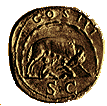.svg.png)
τα καταφέρατε
επιτέλους
Φωτογραφίες από τη Σημερινή Πορεία
να μαζωχτήτε και να διαδηλώσετε
το συμφέρον σας
ΜΠΡΑΒΟ
ελπίζω να έχουν συνέχεια και διάρκεια
αυτές οι κινητοποιήσεις
μέχρι να αποκατασταθούν
- η τιμή,η ελευθερία,η ισότητα και τα δικαιωματά σας -
ATHENS (Reuters) - Police clashed with stone-throwing youths in Athens on Thursday as tens of thousands of strikers protested against draconian cutbacks aimed at pulling Greece out of a debt crisis shaking the euro zone.
In one central square hundreds of protesters hurled sticks and stones at riot police, who responded by baton-charging the crowd and firing several rounds of teargas.
The clashes came after more than 20,000 protesters marched through Athens beating drums and chanting slogans such as "Plutocrats must pay for the crisis" to mark the second general strike in two weeks.
Groups of anarchists threw petrol bombs, smashed shop windows, damaged cars, set garbage containers on fire and hurled lumps of marble torn from steps of the Bank of Greece.
Two protesters and 13 police officers were slightly wounded and 16 protesters detained, police said. But the level of violence was much lower than in 2008 riots that paralyzed Athens for weeks after the police killing of a teenager.
"Everybody is watching Greece to see the depth, intensity and sustainability of protests," said Theodore Couloumbis, deputy head of the ELIAMEP think-tank and a professor of international relations at the University of Athens.
"These protests are more than likely similar to the farmers' blockades earlier this year, which ran out of steam after a while," he said.
Participation in the Athens marches was slightly higher than in the previous nationwide strike on February 24 but not huge by Greek standards and much smaller than a 100,000-strong march against similar measures in the Irish capital last year.
"People understand we are going through difficult times," a senior government official said. By late afternoon, the streets had largely returned to normal.
EU politicians and credit rating agencies have broadly welcomed Greece's latest budget measures but have said quick and smooth delivery will be key to re-establishing the country's credibility diplomatically and as a borrower.
The cost of insuring Greek debt against default rose, as did the premium investors charge to hold Greek bonds rather than German benchmarks, as EU policymakers injected a dose of cold reality into talk of creating a European monetary fund.
Thursday's strikes were organized by labor unions representing half of the country's 5 million strong workforce, protesting cuts in civil servants' income, tax hikes, a pension freeze and plans to raise the retirement age.
The walkouts grounded flights, docked ships, shut schools and hospitals and halted public transport. Many archaeological sites and museums were closed to visitors and the publication of GDP and unemployment data was postponed.
WHERE DID THE MONEY GO?
There was no news on television and radio as journalists were on strike. Bank employees, firefighters, tax collectors and even some police officers were also among those marching. Unions are preparing further action in April and May.
Most Greeks believe that, despite the protests, the cash-strapped socialist government will press ahead with a budget plan agreed last week after months of wrangling with the EU and intense pressure from financial markets.
But the 4.8 billion euro ($6.5 billion) package of cutbacks is viewed by many as hitting the wrong people in a country with widespread corruption and tax evasion.
"The measures are unfair ... we cannot make it, we have children, families. We need to find the money to support them," said 60-year old health sector worker Odysseas Panagopoulos. "Banks and rich people should pay for this crisis."
Athens' streets echoed with loud-speakers blaring slogans calling for the rich to pay for the debt crisis. "No sacrifice for the rich!" protesters chanted holding banners reading: "Where did the money go?."
The general strike took place as EU policymakers are discussing ways to help the euro zone weakling.
Officials and unions gave widely diverging estimates of participation in the strikes. Interior ministry officials said about 15 percent of civil servants had walked out, while their union put the level at over 65 percent.
Last week's package, aimed at reassuring markets that Athens can handle a 300 billion euro debt mountain, came just 5 months after the socialists won an election on a promise to help the poor deal with Greece's first recession in 16 years.
"This government deceived us," said Zaharoula Toulia, a 57-year-old pensioner who lives on 800 euros a month and voted for the socialists. "They said there was money. Where is it?"































0 σχόλια:
Δημοσίευση σχολίου